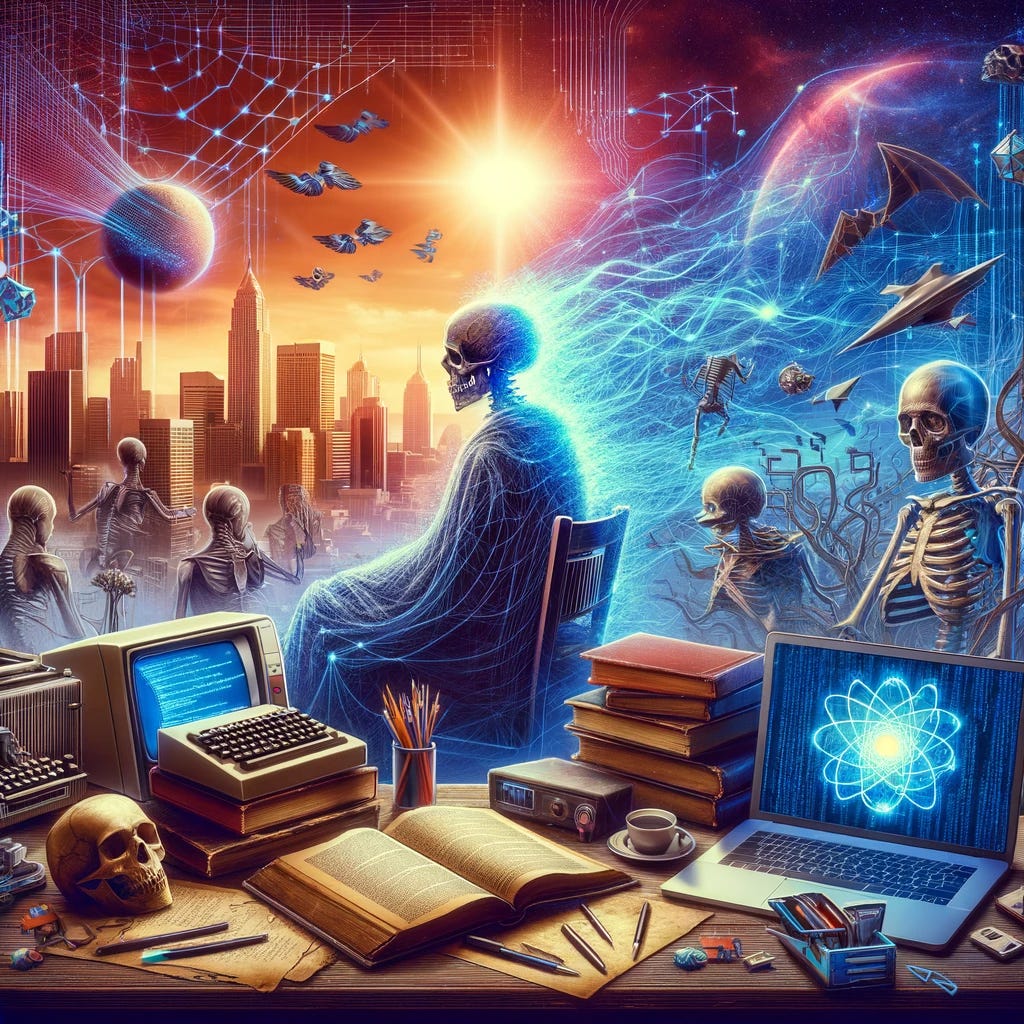Coding is Dead, Long Live Coding
Death & Rebirth
Remember that old line from Andersen’s article “Why software is eating the world”? Probably few lines of text have had a deep effect on people's lives and perception of the future as those words. Probably, but still, let us not look down upon the influence –and almost reverence– that software and programming have in today's world. For more and more people it has become their bread and butter while for others it's their irreversible new career path whether they want to or not (shout out to all my bioinformatic peeps who had to learn Python instead of Lab Safety protocols because now y’all are programmers, not scientists).
More and more industries have indeed been on the path towards digitalization where more and more of the scientific, analytical, and even empirical work is being done by software rather than anywhere else.
Of course, AI is penetrating most if not all data, and programming jobs faster and faster which leaves us with a new question, if now more and more work is done by programming and More and more AIs are developing increasingly better skills for coding what happens when AI can code at a sufficiently good level or even better than most humans?
Magic Stones With Runes on Them
In the world of computing and coding, it's almost like practicing a form of modern magic. Like ancient incantations, you learn a secret language full of mysterious codes and phrases. This knowledge allows you to transform ordinary materials like silicon and plastic into magical objects, inscribed with complex circuitry like old runes. By applying these secret words and intricate designs, you can make these seemingly mundane rocks perform extraordinary tasks, from calculating complex equations that help us explore distant planets, to bringing to life a stream of your favorite TikTok videos on your phone screen.
Since the late 90s, the magic of computing has increasingly woven its spell over every aspect of human life, transforming it into the most influential and dominant force in technology and industry. Computing has permeated every human endeavor, bestowing upon almost every individual a kind of magical capability through their devices. These modern-day talismans – smartphones, laptops, and tablets – are imbued with the power to connect, create, and calculate at a scale once unimaginable.
This world-changing technology has revolutionized the way we communicate, turning distant whispers into global conversations. It has redefined our access to knowledge, making the sum of human understanding merely a few taps away. In the realms of medicine, space exploration, and engineering, this magic has enabled leaps in innovation and problem-solving, harnessing vast computational power to tackle challenges from mapping the human genome to exploring the farthest reaches of space.
In business and industry, this sorcery of computing has brought about an era of unprecedented efficiency and connectivity, weaving together global markets and supply chains with the intricacy of a spell. The arts and entertainment have been transformed as well, with digital wizardry creating new realms of creativity and storytelling.
Now, the magic is advanced enough that we can create GLLMs(Generative Large Language Models), and just like the golems of tales they can be incredible assistants and tools that can help us or they represent a potential risk, so we need to be responsible on how we raise and develop our golems.
Golems Everywhere
With the rise of GLLMs(I read this as Golems, hope you too) we can start to feel the profound impact of generative AI coding tools like GitHub Copilot or Chat GPT on software development. These tools are transforming the developer workflow by offering code suggestions and entire functions to developers. They represent a significant shift from traditional coding methods, enabling developers to work more creatively and productively since they have at their disposal a somewhat competent coder with deep knowledge and speed to produce code. Generative AI differs from other AI tools and automation in that it allows for more creative and less restricted coding, enhancing the developer's role to focus on strategic decision-making and abstract thinking while the AI does the “grunt work”.

The benefits of generative AI in coding are substantial. GitHub Copilot, for example, has been shown to increase coding speed by up to 55%, with developers feeling 88% more productive. GLLMs are not just about automating tedious tasks, they empower developers to be more creative and tackle larger, more complex problems. This technology is still in its early stages, but its potential for transforming software development is vast and exciting. Also, they offer no-coding solutions and pathways for people with little or no knowledge of coding to describe a problem thoroughly enough and get something of a cohesive answer.
And yeah, at the moment someone with completely zero experience in coding could solve small problems and develop small programs that could assist them in their job, which is amazing, but the current state of the art for GLLMs is not enough to completely develop or build large or complex enough programs and tools But it is only a matter of time. Now we could be having low-level positions of coders being replaced by some competent programmers alongside an AI. But what happens when these tools improve exponentially?
The Diminishing Need for Basic Coding
The advent of Generative Large Language Models (GLLMs) will usher in a new era in the field of software development, particularly with the rise of 'non-coding coding' which is not just a cute oxymoron but a possible reality that we will be seeing soon. This means people without formal programming expertise could develop software using intuitive, natural language interfaces alongside AIs, that translate plain language commands into complex code, effectively democratizing software development.
This shift lowers the entry barrier to coding, allowing enthusiasts, entrepreneurs, and professionals from non-technical backgrounds to create or contribute to software projects. (Also, it can help not-so-savvy economists/data scientists like yours truly be more competent) It could also foster a more inclusive environment where the ability to conceptualize solutions is more critical than the technical know-how of writing code. As a result, we are hopefully on the way to witnessing a power surge in innovation and diversity in software development, as a broader range of perspectives and ideas find their way to the world because people with expertise in other areas can become software sorcerers as well.
The impact of GLLMs and non-coding coding on education and job markets will be profound and multi-faceted no doubt. In education, there's a potential shift from a traditional, syntax-heavy programming curriculum toward a more conceptual and problem-solving-focused approach. As the need to memorize specific programming languages decreases, education can focus more on teaching the fundamental principles of computer science, logic, and algorithmic thinking. And just like the job market more and more fields of study will be infused with software development and software-thinking which could accelerate and increase the efficiency and the capabilities of different areas. And this is not even counting the impact that AI could have as assistants, personal teachers, and guides for students in their educational path.
This shift could make computer science more accessible and appealing to a wider range of students, fostering a diverse generation of tech-savvy individuals. In the job market, the demand for traditional coding skills may evolve, placing higher value on creative problem-solving, design thinking, and the ability to work collaboratively with AI tools. Also, it could cast a stronger doubt for a lot of people if going into a formal university is even worth it because maybe self-teaching alongside an AI teacher and some minimum competence in coding could secure a somewhat effective career for some people. This seems like a dream to some and a nightmare to others, personally if there are more pathways opening up for humans to develop and achieve their own personal dreams and goals, good for them.
Will Developers Become This Century’s Wagoneers?
I mean If you think about low-end and most “corporate” usages of coding and software for businesses and even some basic development I think most Data analytic jobs will be quickly automated or efficiently done by fewer and fewer people. Just like what was previously described about the growing capabilities of GLLMs to help people code and write software will have a huge impact on the job markets and probably send a lot of people looking for any other career path ( though who knows if we will even have jobs by then?) But still on the high end of this scale for the extremely productive and competent programmers, the job market is incredibly competitive.
The Big tech companies are spilling BILLIONS into AI development and competing to develop and release larger and better AI tools it has become this century’s space race towards AGI. And so far we cannot develop newer AIs being built by their previous model (that would be a singularity and we’re some years away from it) So the need for extremely capable and advanced human capital is at an all-time high, which has had effects in other areas of the tech world.
So even though we might see the trend of GLLMs developing better capabilities for software development based on natural language prompts. The full erasure and rendering obsolete of developers and coders is still a distant thought, also most likely we will automate a whole bunch of other jobs before those. I think this is an important thing to keep in mind when approaching a potential shift in your career in these uncertain times we live in. Maybe the job you’re in right now might be on a downward trend, but software jobs in the same industry might be still needed in the future and a shift or complement to what you are currently doing with a ✨Sprinkle✨ of Data science or programming on the top might put you on the path towards survival in the age of AI… for some time at least…
So should I learn how to code?
I mean I ain't an expert in job hunting or career building but yeah sure why not, if that is something that you see as attractive and fun, but also on a bigger picture vision, I would highly recommend having a baseline portfolio of software skills will become more and more demanded and even be the baseline for most positions in the future. Not necessarily having in-depth expertise or knowledge but at least skills on how to problem solve and work alongside GLLMs that could accelerate your workflow.
I am way more excited to see the impact these golems will have in entrepreneurship and innovation of new solutions to problems we have with AI-enhanced solutions rolling out faster and faster, Scientists and technical-savvy people from different industries will have their productivity and capacity for building companies and solutions be enhanced incredibly in the coming years. So we might be seeing a huge wave of half-baked AI-generated startups claiming to solve the world's problems, but in between the muck of mediocrity, I know this will also increase the chances of finding golden opportunities and ideas that will thrive and flourish.
Like all change and shift this will democratize the access and capacity to build great things but not everyone will be capable of wielding these tools properly so as an optimist at heart I can’t wait for the future of coding and the companies that will jump into the scene in the coming years.





I think we will be still coding but not in the way we used to do it. What happened in chess and Go after AI mastered these games may also happen in coding. It may result in discovering new ways of writing programs. Maybe future programmers will be more akin to software architects of today, thinking more on the higher level while AI writes the code.